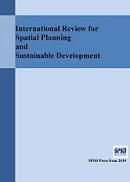
International Review for Spatial Planning and Sustainable Development
Scope & Guideline
Bridging disciplines for a greener tomorrow.
Introduction
Aims and Scopes
- Spatial Planning and Development:
Research that explores methodologies and frameworks for effective spatial planning across urban and rural contexts, emphasizing sustainable development practices. - Environmental Sustainability:
Studies assessing the impact of land use, urbanization, and environmental changes on ecological systems and community well-being, often employing quantitative and qualitative analyses. - Community Engagement and Governance:
Examinations of community-based governance models, public participation in planning processes, and the role of local stakeholders in sustainable development initiatives. - Urban-Rural Linkages:
Investigations into the connections between urban and rural areas, focusing on integrated approaches to enhance socio-economic and environmental sustainability. - Innovative Planning Techniques:
Research showcasing new tools and methodologies, such as multi-criteria decision-making (MCDM) and space syntax analysis, for addressing complex spatial planning challenges.
Trending and Emerging
- Impact of Technology on Urban Spaces:
Increased focus on how technologies such as smart city initiatives and digital tools influence urban planning and public spaces, reflecting a growing intersection between technology and urban development. - Climate Resilience and Adaptation:
Research addressing climate change impacts and adaptation strategies in urban planning has gained momentum, emphasizing the need for resilient infrastructure and community preparedness. - Health and Well-being in Urban Environments:
A rising interest in the relationship between urban design, public spaces, and the health outcomes of residents, particularly in the context of post-pandemic recovery. - Sustainable Transportation Systems:
Emerging studies on the planning of sustainable transportation systems and their integration into urban environments, highlighting the importance of mobility in achieving sustainability goals. - Cross-Border and Regional Cooperation:
A trend towards examining cross-border planning and regional collaborations, reflecting the importance of interconnectedness in addressing spatial planning challenges.
Declining or Waning
- Historical Preservation Studies:
Though still relevant, the frequency of studies focusing solely on the preservation of historical sites and architecture has decreased, possibly due to a shift towards more contemporary planning challenges. - Traditional Urban Design Principles:
Discussions centered on classical urban design principles have waned, as newer methodologies and technologies become more prevalent in addressing urban planning issues. - Rural Development Policies:
Interest in rural development policies has seen a decline, possibly overshadowed by a greater emphasis on urbanization and its associated challenges in sustainable development.
Similar Journals
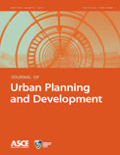
JOURNAL OF URBAN PLANNING AND DEVELOPMENT
Exploring the Intersection of Planning and Progress.The JOURNAL OF URBAN PLANNING AND DEVELOPMENT, published by the ASCE-AMER SOC CIVIL ENGINEERS, stands as a pivotal platform in the realms of urban studies, civil and structural engineering, and development. With an ISSN of 0733-9488 and E-ISSN of 1943-5444, this journal aims to disseminate high-quality research addressing critical urban planning challenges, fostering innovative solutions, and contributing to sustainable development practices. Spanning from its inception in 1979 to the anticipated issues up to 2024, the journal proudly occupies the Q2 category across multiple disciplines, including Civil and Structural Engineering, Development, Geography, Planning and Development, and Urban Studies. Its noteworthy Scopus rankings reflect its influence, notably being positioned in the 76th percentile in Urban Studies. With no open access options currently available, the journal remains a selective forum for scholarly discourse, attracting researchers, professionals, and students eager to engage with cutting-edge developments in urban planning and design.

Bitacora Urbano Territorial
Championing Open Access for a Collaborative Academic CommunityBitacora Urbano Territorial is an esteemed open-access journal published by Universidad Nacional de Colombia, dedicated to advancing research in the intricate fields of urban studies, geography, and the arts and humanities. Since its inception in 2009, this journal has become a vital platform for academics, practitioners, and students alike in analyzing and addressing the multifaceted dimensions of urbanization, spatial planning, and territorial development. With an evolving focus and a commitment to fostering scholarly dialogue, Bitacora Urbano Territorial proudly holds a Q2 ranking in Arts and Humanities (miscellaneous) and Q3 rankings in both Geography, Planning and Development and Urban Studies, reflecting its growing impact within the academic community. The journal welcomes contributions that explore innovative research, case studies, and theoretical advancements, providing a comprehensive reflection of urban transformations in Latin America and beyond. Emphasizing accessibility, the journal has embraced an open access model since 2016, ensuring that critical knowledge is disseminated widely to enhance understanding and promote collaboration across disciplines.
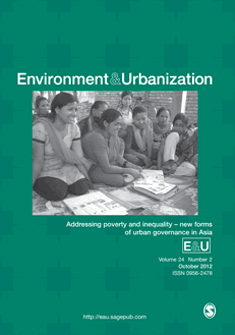
ENVIRONMENT AND URBANIZATION
Exploring the nexus of urban life and environmental health.Environment and Urbanization is a leading interdisciplinary journal published by SAGE Publications Ltd, dedicated to advancing knowledge in the fields of Environmental Science and Urban Studies. With a strong focus on the interactions between urban environments and ecological systems, this journal has established itself as a pivotal resource for researchers, professionals, and students interested in sustainable urban development and environmental management. Since its inception in 1989, Environment and Urbanization has continually provided high-quality, peer-reviewed articles that foster a deeper understanding of contemporary urban challenges, making it a highly cited publication with an impressive impact factor. As evidenced by its Q1 ranking in both Environmental Science (miscellaneous) and Urban Studies for 2023, the journal stands at the forefront of research, boasting notable Scopus rankings in its fields. By remaining committed to publishing cutting-edge research, the journal aims to influence policy and practice across the globe, ultimately aiding in the creation of more resilient and livable urban areas.

Cuadernos de Vivienda y Urbanismo
Shaping Sustainable Futures in Housing and UrbanismCuadernos de Vivienda y Urbanismo, published by the Pontificia Universidad Javeriana, Facultad de Arquitectura y Diseño, serves as a vital platform for researchers and practitioners in the fields of urban studies and planning. With a focus on the intricate relationships between housing, urban development, and social dynamics, this journal aims to foster interdisciplinary discourse and present innovative research that addresses contemporary urban challenges. Although its coverage on Scopus has been discontinued from 2012 to 2019, it continues to be an informative resource for understanding urban phenomena, evidenced by its rankings in the 24th percentile in Urban Studies and the 10th percentile in Geography, Planning and Development. Scholars and professionals are encouraged to explore the rich repository of articles that reflect both local and global contexts, providing insights that inform policy and practice in urban environments.
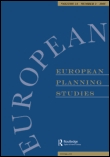
EUROPEAN PLANNING STUDIES
Advancing Urban Insights for Sustainable FuturesEUROPEAN PLANNING STUDIES is a leading journal in the field of urban studies, published by Routledge Journals, Taylor & Francis Ltd. Since its inception in 1993, this esteemed publication has been pivotal in advancing the discourse on geographical, planning, and developmental issues across the European landscape. With a commendable 2023 Q1 rating in the Geography, Planning, and Development category and a remarkable rank of #88 out of 821 in Scopus, the journal is recognized for its rigorous peer-reviewed articles that provide innovative insights and critical analyses. Although the journal does not offer open access, it caters to a diverse readership, including researchers, professionals, and students, ensuring a comprehensive understanding of contemporary planning challenges and strategies. The journal's objectives include fostering interdisciplinary dialogue among planners, policymakers, and academics, making it an essential resource for those engaged in shaping sustainable urban environments and informed spatial governance in Europe and beyond.

International Journal of Engineering and Geosciences
Pioneering research at the forefront of geosciences and engineering.The International Journal of Engineering and Geosciences, with ISSN 2548-0960, is a premier academic journal published by Selcuk University Press, specializing in the interrelated fields of engineering and geosciences. Established as an Open Access resource in 2016, the journal aims to enhance the dissemination of research, fostering collaboration and innovation within the scientific community. Based in Turkey, this journal serves as a vital platform for researchers and professionals to share their findings and contribute to the advancement of knowledge in environmental science and related disciplines. With an impressive Q2 category ranking in the field of Environmental Science (miscellaneous) for 2023, it ranks #81 out of 219 in Scopus, placing it in the 63rd percentile. The journal not only acknowledges transformative research trends from 2019 to 2024 but also emphasizes the importance of sustainability and environmental stewardship in engineering practices, making it an indispensable resource for students, researchers, and professionals passionate about the intersection of these disciplines.
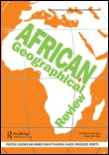
African Geographical Review
Illuminating the Intersections of Geography and Development in AfricaAfrican Geographical Review is a pivotal academic journal published by Routledge Journals, Taylor & Francis Ltd, whose mission is to advance knowledge and understanding of geographical dynamics across the African continent. With an ISSN of 1937-6812 and an E-ISSN of 2163-2642, this journal consistently delivers high-quality research, showcasing innovative perspectives and interdisciplinary approaches within the fields of Earth-Surface Processes and Geography, Planning and Development. Recognized in 2023 with a Q2 ranking in these categories, it ranks #231 out of 821 in Social Sciences and #63 out of 179 in Earth and Planetary Sciences according to Scopus metrics, reflecting its substantial impact and relevance. Featuring research that spans various geographic themes, the journal not only champions academic inquiry but also fosters a deeper understanding of spatial and environmental challenges unique to Africa. Engaging with a diverse audience of researchers, professionals, and students, the African Geographical Review serves as an indispensable resource for those committed to enhancing geographic scholarship and informing sustainable development practices across the continent.
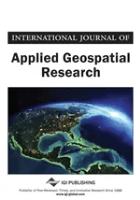
International Journal of Applied Geospatial Research
Fostering excellence in applied geospatial studies.International Journal of Applied Geospatial Research is an esteemed publication dedicated to advancing the field of geospatial research. Published by IGI Global, this journal provides a platform for innovative studies from 2010 to 2024 that encourage multidisciplinary contributions across Earth and planetary sciences and geography. While currently not offering open access, the journal's focus on applied research ensures that it remains highly relevant to both academics and industry professionals alike. With an ISSN of 1947-9654 and an E-ISSN of 1947-9662, it has been indexed in various databases, reflecting its emerging significance with rankings such as Q4 in Earth and Planetary Sciences and Geography according to Scopus, placing it at the intersection of critical research and practical application. Researchers, professionals, and students can expect insightful articles that enhance understanding and drive innovation in geospatial applications essential for informed decision-making in a rapidly changing world.
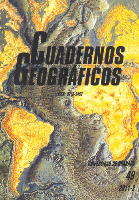
Cuadernos Geograficos
Pioneering research in geography and earth sciences.Cuadernos Geograficos is a distinguished open access journal published by UNIV GRANADA in Spain, dedicated to advancing the fields of geography, planning, and earth-surface processes. With an ISSN of 0210-5462 and E-ISSN 2340-0129, this journal has been serving as an essential platform for scholars since its inception in 1983. By providing rigorous peer-reviewed research, Cuadernos Geograficos contributes significantly to the academic discourse within these disciplines, holding a respectable position in the Q3 category for both Earth-Surface Processes and Geography, Planning, and Development as of 2023. The journal is indexed in Scopus, ranking #431/821 in Social Sciences and #100/179 in Earth and Planetary Sciences, affirming its relevance and impact within the scholarly community. With its commitment to open access since 1999, Cuadernos Geograficos ensures that vital research is accessible to a diverse audience of researchers, professionals, and students, fostering knowledge sharing and collaborative advancements in the geographical sciences.

Journal of Geographical Sciences
Pioneering Research in Geography and Environmental Studies.Welcome to the Journal of Geographical Sciences, a premier publication in the field of Earth and Planetary Sciences that has consistently demonstrated its impact and relevance since its inception in 2001. Published by SCIENCE PRESS, this esteemed journal is recognized for its rigorous peer-review process and high-quality research, achieving an impressive Q1 ranking in the 2023 category of Earth and Planetary Sciences (miscellaneous). With the latest Scopus ranking placing it at Rank #13 of 159, putting it in the top 8% of its field, the journal serves as a vital platform for disseminating significant findings and innovative methodologies in geography, environmental studies, and related disciplines. Although not an open-access journal, it offers exceptional visibility through its publication standards and accessibility in academic databases. Based in Beijing, China, the Journal of Geographical Sciences continues to pave the way for scholarly discourse and collaborative research, appealing to researchers, practitioners, and students dedicated to advancing our understanding of geographical phenomena.